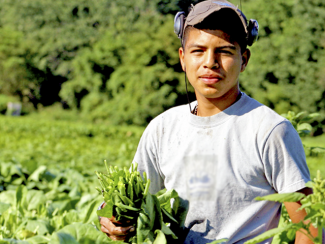GROWING PAIN
Migrant workers seduced, cheated, abandoned by Canadian job agents

THEY WERE THE PERFECT MARKS. Just what Esvin Paredes was looking for: few of the eleven men could read or write, most couldn’t speak English, they were “foreigners”, over 3000 kilometres from home, the law gave them no rights. Paredes swooped in.
He abused and cheated them. Got caught. Got convicted. The court ordered Paredes to pay the men $300,000. It didn’t matter. They got nothing.
Seduced, cheated, abandoned
The 11 men came to Quebec as part of the temporary foreign workers program. According to the conditions of the program they were permitted to work for one specific employer.
The workers’ passports, social insurance cards and work permits were held by the agency and they were each obliged to pay an immigration consultant $3,000 to $4,000, which the agency deducted directly from their salaries.
However, once they got to Quebec they were approached by Esvin Paredes who ran a job placement agency called Entreprise de placement Les Progrès Inc. Paredes seduced the men into coming to work for him. He offered them better working conditions and higher salaries. He also told them that changing their employer would be legal. It wasn’t.
The men were put to work at various work sites for up to 18 months. They were always housed in crowded, poorly heated quarters, constantly harassed, forced to work long shifts—sometimes 24 hours straight. They were not paid. When they complained, Paredes threatened to report them to immigration authorities to get them sent home for breaking the terms of their original contract.
Paredes even had some of the men help his wife do housework. Again without pay.
The law steps in
The Canadian Border Services Agency officials caught up with Paredes in 2016 and charged him with several offences.
A Quebec labour board judgment in 2019 found that “the plaintiffs were victims of psychological harassment for a period varying from six weeks to 18 months … the plaintiffs found themselves in a situation where … the employer threatened to denounce them to immigration (authorities) and (threatened) their physical well being or that of their families in Guatemala if they did not accept these conditions.”
The board found that the workers — who were paid about $300 a week — were not even earning the provincial minimum wage.
“This is shocking conduct, unacceptable by society, that deserves to be denounced,” wrote France Giroux, administrative judge with the board.
The “immigration consultant” confessed to the board that he did nothing to help the Guatemalans’ with their work permits “despite the large sums paid”.
Giroux noted that the men, given their language and literacy skills, were particularly vulnerable and in a country they knew nothing about.
Paredes denied the men were badly treated and said he was misled by the immigration consultant concerning the legality of their employment.
Cold comfort, empty victory
The board dismissed his version of the facts, noting he gave “evasive testimony, replying many times he could not remember specific events, which stained the credibility and reliability of his testimony.”
The board awarded each of the workers $5,000 in punitive damages “by reason of the seriousness and high reprehensible nature of the acts committed by the employer”.
Each man was also awarded $20,000 to $30,000 in moral damages depending on his individual experience.
It’s unlikely that any of the 11 men will ever see any of that money. The agency went out of business even as the labour board hearings were under way.
What happened to these 11 men from Guatemala is not unusual. This is all too often the story for many of the over 30,000 farm workers we recruit to come to Canada every year to grow and harvest the fruit, vegetables and flowers that make up our multi-billion dollar agriculture industry. We need to change our laws to change that story.
The federal government launched a review in 2017 of the “primary agriculture” stream in Canada’s temporary foreign worker (TFW) program. The results were quietly published in February 2019. The review has not brought any significant change to the lives and working conditions of migrant workers in Canada.
Unions like the United Food and Commercial Workers and activist groups like the Migrant Workers Alliance for Change have worked hard for years and years to get as much justice for farmworkers as other Canadian workers can expect. That struggle continues.
UFCW
http://www.ufcw.ca/index.php?option=com_content&view=article&id=2009&It…
MIGRANT WORKERS ALLIANCE FOR CHANGE
https://migrantworkersalliance.org/
- 30 -













Add new comment